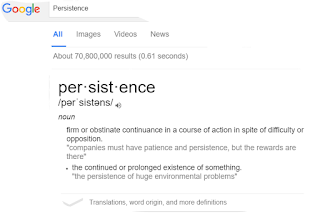It doesn't matter whether you are an individual, an identity (music), or brand, you can carefully craft your audience based on who resonates the most with you.
Something I discovered lately: the masters of algorithms like GOOGLE, TWITTER, LINKED IN are identifying content creators as the next big influence wave.
Maybe I had that hunch 10 years ago. I recognized how important it was to establish an identity that could be synonymous with brand. There was no question who was behind the brand. It would develop a following because of integrity and authenticity.
I wrote early on, that I was putting a lot of my apples on the GOOGLE cart. It seemed logical that the super power of information > GOOGLE SEARCH > was going to lead the pack.
If you compare that to TESLA and ELON MUSK, then we're missing the point.
The strongest voice, the most authentic voice, and the voice that resonates with the majority of people online are going to be the most powerful disruptions.
These entities are corporations with investors and shareholders that demand a return on their investment. Fast. No hassle.
I've watched both Facebook and Twitter evolve as they tried to drift away from a social network to becoming a viable tech stock.
The secret to longevity is going to be who lasts.
What has happened with these two startups with imposter's syndrome is they forgot the main course.
In launching any new venture, you have to be able to answer, unequivocally, succinctly, resolutely
Who is your customer?
The ship can sail once you've anchored that
Most companies mistakenly steer the ship towards shareholders and miss the wind for their sails.
Okay, then let me ask:
Who did you have in mind when you created it?
We should all be well-versed on Steve Jobs' and Bill Gates philosophies, however, the main opportunity they uncovered was looking at who their customers were and what was available to them, and make something better, easier.
My point is that Twitter and Facebook did exactly that:
Forgot who the customers is
The idea that resonated to allow either to grow was the adopters, users, and spreaders of word-of-mouth (still the most effective way of spreading good ... or bad news). Social Media just trumped it up on steroids and removed barriers by beliefs, geographic location, race, culture, love interests.
As a consumer and marketing intern, it is not surprising to see the numbers.
They tell the story.
Once Facebook and Twitter tried to become corporations, they fell down the rabbit hole because they forgot who got them there to begin with.
One just has to watch not even 5 minutes of Facebook's Zuckenberg interviews in the US, and you just can't help but get the sense of a really lucky genius idea run by someone still in High School. Someone who ignores advice or heeds wisdom from others.
The baby shoes is starting something.
The first steps is becoming an economical climate or environment with a loyal following who have trust that they have your best interests at heart.
FACEBOOK abuse of trust is a story of "how to get away with privacy infiltration".
I'm still there: it is still one of the best homes to my loyal tribe. I haven't cut off my nose to spite my face by deleting myself there. I did remove the side, personal one as I wanted to focus the energy on only a few areas.
TWITTER abuse of power is a story where they are now trying to dictate who and who cannot be on their platform. What is acceptable in their terms are not necessarily good for its users. PURGING, SUSPENDING accounts would be an example.
ONCE users start to lose the glimmer then the answer to who the customer is becomes realized: the users, members, audience and clicks determine the outcomes now. What is becoming more suspect is the usual technology trick of try me, test me, but if you want this or that THAT IS better it will cost you.
That's a failed business plan
The one where shareholder price or value is where they determine the executive board's ROI return on investment of the CEO and whether they stand behind mostly him (less than 10% of executives on Fortune 500 are women).
































